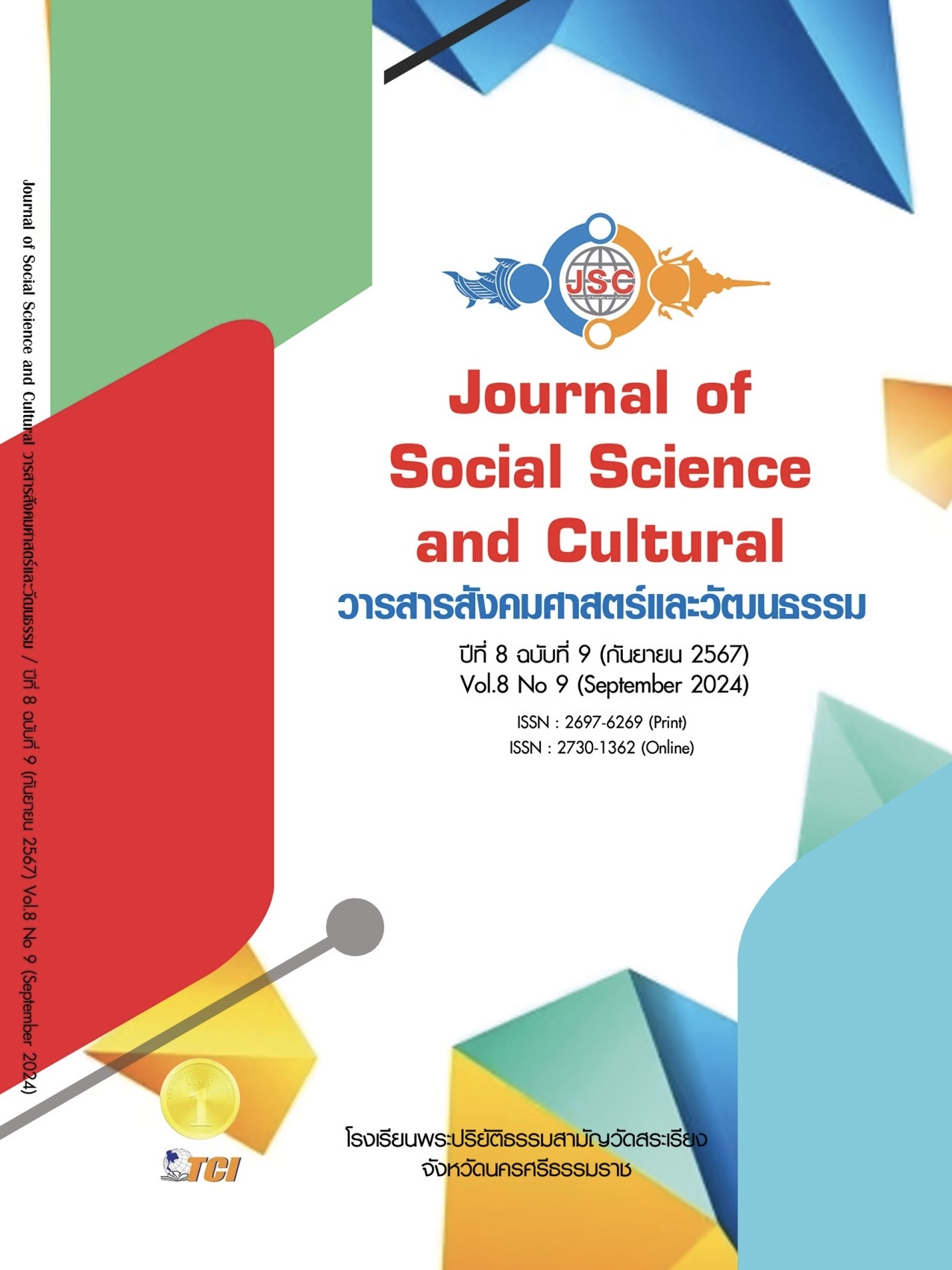DEVELOPMENT OF IG-PROVE LEARNING MANAGEMENT MODEL TO PROMOTE THE ABILITY OF MATHAYOMSUKSA 2 STUDENTS TO SOLVE COMPLEX MATHEMATICAL PROBLEMS
Main Article Content
Abstract
This research and development endeavor aimed to 1) investigate foundational data for the construction and development of the IG-PROVE learning management model 2) develop an effective IG-PROVE learning management model that meets the 75/75 criteria 3) implement the IG-PROVE learning management model and 4) evaluate and refine the IG-PROVE learning management model. The evaluation specifically targeted learning outcomes in terms of knowledge, complex mathematical problem-solving skills, and problem-solving procedural steps, through a comparative analysis of pre- and post-implementation results. Furthermore, student satisfaction with the IG-PROVE model was gauged. The research sample comprised 29 Mathayomsuksa 2 students from Sirindhorn School during the second semester of the 2022 academic year, selected via purposive sampling. Research instruments encompassed needs assessment forms, group discussion records, lesson plans, achievement tests, and satisfaction questionnaires. Data analysis utilized percentages, means, standard deviations, Dependent Samples t-tests, and content analysis. The resultant IG-PROVE learning management model consists of seven sequential steps 1) Introduction to new knowledge 2) Concept building, 3) Planning and implementation 4) Review and revision 5) Fostering proficiency 6) Checking learning outcomes and 7) Adjusting understanding. The model exhibited efficacy, achieving a 78.31/78.39 efficiency criterion. A statistically significant improvement (p < .05) was observed in students' complex problem-solving achievement post-learning compared to pre-learning. Additionally, students reported high levels of satisfaction with the learning management model ( = 4.41, S.D. = 0.75). These findings underscore the effectiveness of the IG-PROVE learning management model in cultivating complex mathematical problem-solving capabilities.
Article Details
References
ชัยยงค์ พรหมวงศ์. (2520). ระเบียบวิธีการวิจัยทางพฤติกรรมศาสตร์. (พิมพ์ครั้งที่ 3). กรุงเทพมหานคร: จุฬาลงกรณ์มหาวิทยาลัย.
ธานินทร์ เอื้อภิธร. (2560). การพัฒนาผู้เรียนยุคดิจิทัล. วารสารศึกษาศาสตร์ มหาวิทยาลัยนเรศวร, 19(2), 247-259.
พนม จองเฉลิมชัย. (2563). การพัฒนารูปแบบการจัดการเรียนรู้ที่ส่งเสริมทักษะการแก้ปัญหาเชิงสร้างสรรค์สำหรับนักศึกษาวิชาชีพครู. ใน ดุษฎีนิพนธ์ปรัชญาดุษฎีบัณฑิต สาขาวิชาหลักสูตรและการสอน. มหาวิทยาลัยศรีนครินทรวิโรฒ.
พิภัทร รอยประโคน. (2560). การพัฒนาความสามารถในการใช้เหตุผลทางคณิตศาสตร์ เรื่อง ความเท่ากันทุกประการ โดยใช้วิธี IMPROVE ของนักเรียนชั้นมัธยมศึกษาปีที่ 2. ใน รายงานการวิจัย. มหาวิทยาลัยราชภัฏบุรีรัมย์.
มาเรียม นิลพันธุ์. (2553). วิธีวิจัยทางพฤติกรรมศาสตร์และสังคมศาสตร์. (พิมพ์ครั้งที่ 3). นครปฐม: สถาบันวิจัยประชากรและสังคม มหาวิทยาลัยมหิดล.
ศูนย์ดำเนินงาน PISA แห่งชาติ สถาบันส่งเสริมการสอนวิทยาศาสตร์และเทคโนโลยี. (2566). รายงานการประเมินผลการศึกษา PISA. เรียกใช้เมื่อ มีนาคม 13, 2564, จาก https://pisathailand.ipst.ac.th/
สำนักงานเลขาธิการสภาการศึกษา. (2562). แผนการศึกษาแห่งชาติ พ.ศ. 2560-2579. กรุงเทพมหานคร: สำนักงานเลขาธิการสภาการศึกษา กระทรวงศึกษาธิการ.
Griffin, P. & Care, E. (2014). Assessment and teaching of 21st century skills: Methods and approach. New York: Springer.
Joyce, B. & Weil, M. (1996). Models of teaching. Needham Height. Massachusetts: A Simon & Schuster Company.
Kerlinger, F. N. (1973). Foundations of behavioral research. (2nd ed.). New York: Holt, Rinehart and Winston.
Mainzer, K. (2009). Challenges of complexity in the 21st century, an interdisciplinary introduction. European Review, 17(2), 219-236.
Mevarech, Z. R. & Kramarski, B. (1997). IMPROVE: A multidimensional method for teaching mathematics in heterogeneous classrooms. American Educational Research Journal, 34(2), 365-394.
National Research Council. (2011). Assessing 21st century skills: Summary of a workshop. Washington, D.C: The National Academies Press.
OECD. (2023). PISA 2022 results: What students know and can do - Student performance in mathematics reading and science (Volume I, Revised edition). Paris, France: OECD Publishing.
Simon, H. A. (1957). Models of Man, Social and Rational: Mathematical Essays on Rational Human Behavior in Society Setting. New York: Wiley.
World Economic Forum. (2016). The future of jobs: Employment, skills and workforce strategy for the fourth industrial revolution. Switzerland: World Economic Forum.


